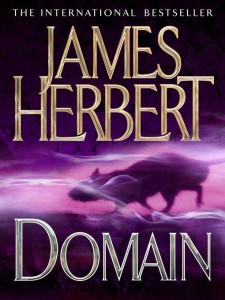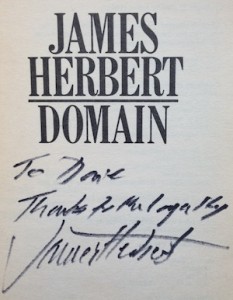
When I’m asked to name books which have influenced me, I regularly mention DOMAIN by James Herbert. In fact, when I’m talking about books which have influenced my writing career, DOMAIN is the book.
For those who don’t know, DOMAIN is the third and final book in Herbert’s RATS trilogy (beginning with RATS in 1974, then LAIR in 1979). Set in the immediate aftermath of a nuclear attack on London, it remains a visceral and relentless read. To this day it’s still the only book I’ve ever finished reading, only to turn back to the beginning and immediately start again. Following the author’s untimely passing back in March, I thought I’d dig out my old yellowed paperback edition (now signed by the man himself – see this link to find out how) to see if the book still resonated with this forty-something bloke as it had when I was in my teens.
Short answer: not quite, but it was still a bloody good read.
Here’s the back cover blurb. Click the link below for my thoughts.
“The long-dreaded nuclear conflict. The city torn apart, shattered, its people destroyed or mutilated beyond hope. For just a few, survival is possible only beneath the wrecked streets – if there is time to avoid the slow-descending poisonous ashes. But below, the rats, demonic offspring of their irradiated forebears, are waiting. They know that Man is weakened, become frail. Has become their prey…”
For me, DOMAIN stands head and shoulders above Herbert’s other books. Those of you who know me and my writing will probably also know that I have little interest in the supernatural – I don’t do ghosts, gods or demons, and I much prefer horror which feels rooted in reality. Growing up in the 1980’s, with the constant threat of thermonuclear war kicking off at any moment, DOMAIN had such an impact on me because it felt less a possibility, more like an inevitable certainty.
I was captivated by the first few chapters – views of the apocalypse from a number of different locations, seen through the eyes of characters who, it was clear from the moment we met them, were probably about to die. Steve Culver, a commercial pilot, stops to help another man, Deeley, as the bombs strike. Fortunately for all concerned, Deeley is a lower-level government lackey, who is able to direct Culver to a shelter.
There’s a certain inevitability to the rest of the story which I’ll not completely spoil because I’d definitely recommend you read this book. The underground shelter, safe for a while, is eventually compromised by rats, and the remaining band of survivors set off on a mission to find the main government bunker, encountering fellow survivors, thousands more rats, and other hazards along the way. It reads like a lot of Herbert’s other books: plenty of clichés, familiar character tropes, and the inevitable romance. It’s also dated in a number of respects with some typically eighties descriptions of ‘undesirable folk’, and the mildest nuclear aftermath you could imagine. Whilst the initial blasts and immediate effects are suitably horrific, after a while the sun comes out and a sense of some normality returns. The book was first published in 1984, its writing pre-dating TTAPS and the theory of nuclear winters (see this link for more information). And yet despite this, DOMAIN remains a hugely entertaining read.
So why did this book have such an impact on me back in the day? A couple of reasons, I think. Firstly, it’s an extremely horrific book. There’s a huge amount of gore, and it’s pretty relentless. As a teenager, I couldn’t remember ever reading anything as bloodthirsty before. Herbert’s descriptions, particularly those of the mounds of bodies eviscerated by rats, remain chilling today. And I loved the fact that every way the heroes turned, they inevitably found themselves facing something even worse than that which they’d just managed to escape.
But for me the most effective parts of DOMAIN (aside from the brutal opening scenes) are the vignettes – little slices of post-apocalyptic life featuring characters unconnected to the main events of the novel. I’d never come across this kind of storytelling before. Rather than jarring against the main thrust of the story as you might expect, these interludes instead massively expand the scope of Herbert’s devastated world and show the futility of trying to survive in this dead land. My personal favourite was subsequently published as a short story entitled ‘Breakfast’. It deals with a woman who, overcome by shock, tries to continue to live normally in the remains of her devastated home with only the bodies of her dead family for company.

Her son silently gazed at the green bread beside his bowl of cornflakes, the cereal stirring gently as small creatures fed beneath. He was grinning, a ventriloquist’s dummy, cheek muscles tightened by shrinkage. A misty film clouded his eyes, a spoon balanced ungripped in his clawed hand. A length of string around his chest tied him to the chair.
If you’ve read the recently republished AUTUMN: THE HUMAN CONDITION, you’ll no doubt understand just to what extent these short stories influenced me. Herbert’s book inspired me to write the first ‘AUTUMN: ECHOES’ which went on to eventually become the HUMAN CONDITION’s 150,000+ words of additional AUTUMN fiction.
I really don’t want to talk about DOMAIN in any more detail for risk of spoiling it – I’ll just recommend you pick up a copy and experience the book for yourself. It was clear just how popular this book remains amongst Herbert’s fans when I interviewed Jim last year – even the slightest mention of the title seemed to get a cheer. I was thrilled to be able to talk to him about the book in private and to tell him just how important it had been to my career. His response? He just looked at me. ‘Yeah, it’s a good book that one,’ he said.
Thanks for reading.
Over the years I’ve recommended many films, books, and podcasts. You can find a full list of them here.
A lot of folks find their way to this site from search engines and social media. If you’re new here, let me introduce myself – I’m DAVID MOODY, author of dystopian horror and science-fiction. I’m best known for the HATER and AUTUMN novels, but you can find all my books here.
If you sign up to my mailing list, I’ll send you some free books to get you started.